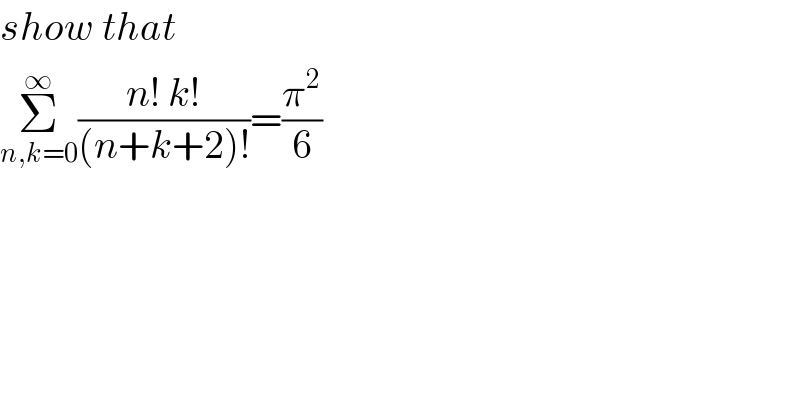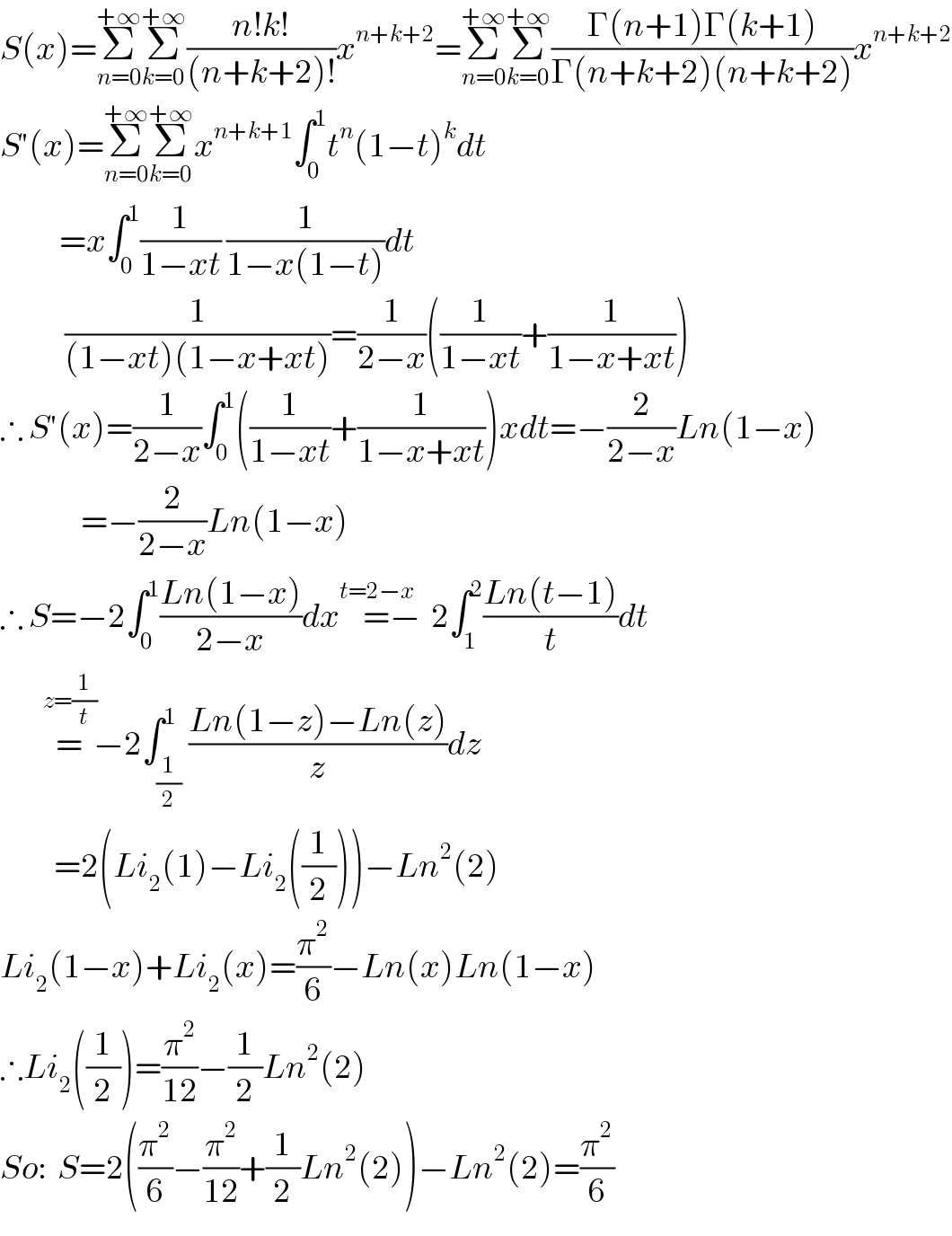Question Number 83629 by M±th+et£s last updated on 04/Mar/20

$${show}\:{that} \\ $$$$\underset{{n},{k}=\mathrm{0}} {\overset{\infty} {\sum}}\frac{{n}!\:{k}!}{\left({n}+{k}+\mathrm{2}\right)!}=\frac{\pi^{\mathrm{2}} }{\mathrm{6}} \\ $$
Answered by Kamel Kamel last updated on 04/Mar/20

$${S}\left({x}\right)=\underset{{n}=\mathrm{0}} {\overset{+\infty} {\sum}}\underset{{k}=\mathrm{0}} {\overset{+\infty} {\sum}}\frac{{n}!{k}!}{\left({n}+{k}+\mathrm{2}\right)!}{x}^{{n}+{k}+\mathrm{2}} =\underset{{n}=\mathrm{0}} {\overset{+\infty} {\sum}}\underset{{k}=\mathrm{0}} {\overset{+\infty} {\sum}}\frac{\Gamma\left({n}+\mathrm{1}\right)\Gamma\left({k}+\mathrm{1}\right)}{\Gamma\left({n}+{k}+\mathrm{2}\right)\left({n}+{k}+\mathrm{2}\right)}{x}^{{n}+{k}+\mathrm{2}} \\ $$$${S}'\left({x}\right)=\underset{{n}=\mathrm{0}} {\overset{+\infty} {\sum}}\underset{{k}=\mathrm{0}} {\overset{+\infty} {\sum}}{x}^{{n}+{k}+\mathrm{1}} \int_{\mathrm{0}} ^{\mathrm{1}} {t}^{{n}} \left(\mathrm{1}−{t}\right)^{{k}} {dt} \\ $$$$\:\:\:\:\:\:\:\:\:\:\:={x}\int_{\mathrm{0}} ^{\mathrm{1}} \frac{\mathrm{1}}{\mathrm{1}−{xt}}\:\frac{\mathrm{1}}{\mathrm{1}−{x}\left(\mathrm{1}−{t}\right)}{dt} \\ $$$$\:\:\:\:\:\:\:\:\:\:\:\:\frac{\mathrm{1}}{\left(\mathrm{1}−{xt}\right)\left(\mathrm{1}−{x}+{xt}\right)}=\frac{\mathrm{1}}{\mathrm{2}−{x}}\left(\frac{\mathrm{1}}{\mathrm{1}−{xt}}+\frac{\mathrm{1}}{\mathrm{1}−{x}+{xt}}\right) \\ $$$$\therefore\:{S}'\left({x}\right)=\frac{\mathrm{1}}{\mathrm{2}−{x}}\int_{\mathrm{0}} ^{\mathrm{1}} \left(\frac{\mathrm{1}}{\mathrm{1}−{xt}}+\frac{\mathrm{1}}{\mathrm{1}−{x}+{xt}}\right){xdt}=−\frac{\mathrm{2}}{\mathrm{2}−{x}}{Ln}\left(\mathrm{1}−{x}\right) \\ $$$$\:\:\:\:\:\:\:\:\:\:\:\:\:\:\:=−\frac{\mathrm{2}}{\mathrm{2}−{x}}{Ln}\left(\mathrm{1}−{x}\right) \\ $$$$\therefore\:{S}=−\mathrm{2}\int_{\mathrm{0}} ^{\mathrm{1}} \frac{{Ln}\left(\mathrm{1}−{x}\right)}{\mathrm{2}−{x}}{dx}\overset{{t}=\mathrm{2}−{x}} {=}−\:\:\mathrm{2}\int_{\mathrm{1}} ^{\mathrm{2}} \frac{{Ln}\left({t}−\mathrm{1}\right)}{{t}}{dt} \\ $$$$\:\:\:\:\:\:\:\:\overset{{z}=\frac{\mathrm{1}}{{t}}} {=}\:\:−\mathrm{2}\int_{\frac{\mathrm{1}}{\mathrm{2}}} ^{\mathrm{1}} \frac{{Ln}\left(\mathrm{1}−{z}\right)−{Ln}\left({z}\right)}{{z}}{dz} \\ $$$$\:\:\:\:\:\:\:\:\:\:=\mathrm{2}\left({Li}_{\mathrm{2}} \left(\mathrm{1}\right)−{Li}_{\mathrm{2}} \left(\frac{\mathrm{1}}{\mathrm{2}}\right)\right)−{Ln}^{\mathrm{2}} \left(\mathrm{2}\right) \\ $$$${Li}_{\mathrm{2}} \left(\mathrm{1}−{x}\right)+{Li}_{\mathrm{2}} \left({x}\right)=\frac{\pi^{\mathrm{2}} }{\mathrm{6}}−{Ln}\left({x}\right){Ln}\left(\mathrm{1}−{x}\right) \\ $$$$\therefore{Li}_{\mathrm{2}} \left(\frac{\mathrm{1}}{\mathrm{2}}\right)=\frac{\pi^{\mathrm{2}} }{\mathrm{12}}−\frac{\mathrm{1}}{\mathrm{2}}{Ln}^{\mathrm{2}} \left(\mathrm{2}\right) \\ $$$${So}:\:\:{S}=\mathrm{2}\left(\frac{\pi^{\mathrm{2}} }{\mathrm{6}}−\frac{\pi^{\mathrm{2}} }{\mathrm{12}}+\frac{\mathrm{1}}{\mathrm{2}}{Ln}^{\mathrm{2}} \left(\mathrm{2}\right)\right)−{Ln}^{\mathrm{2}} \left(\mathrm{2}\right)=\frac{\pi^{\mathrm{2}} }{\mathrm{6}} \\ $$
Commented by M±th+et£s last updated on 04/Mar/20

$${nice}\:{solution}\:{sir}\:{thank}\:{you} \\ $$
